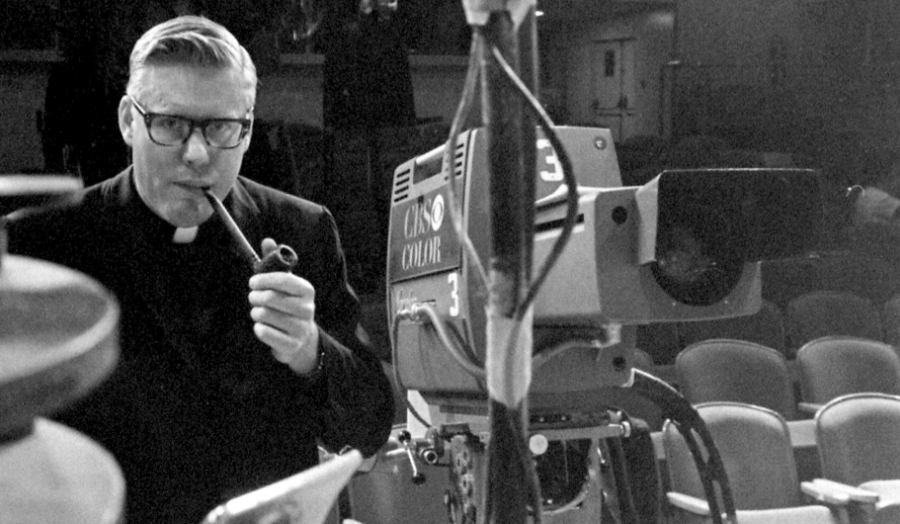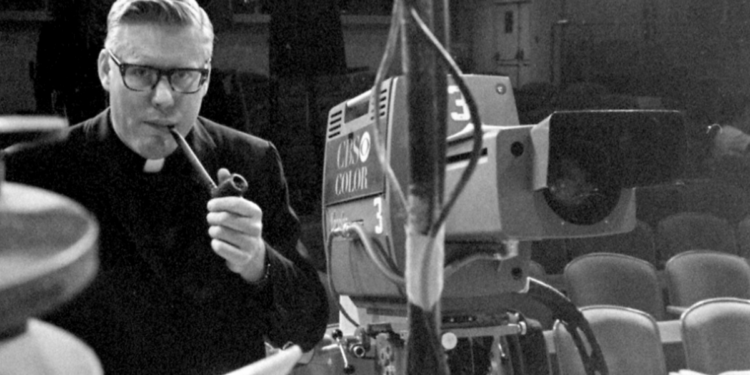
A documentary exploring the late Rev. Ellwood “Father Bud” Kieser’s pioneering path in Hollywood, his impact on the media and his legacy is getting its first national airing on television.
“Hollywood Priest” tells the story of the Paulist priest who arrived in Los Angeles in 1957 and garnered a show biz following. They were first his parishioners at St. Paul the Apostle Church in Westwood, then acted in his dramatic TV productions.
Kieser connected with actors such as Martin Sheen, Bob Newhart, John Amos, Marion Ross and Catherine Hicks, and persuaded them to work for minimal wages to dramatize moral messages before a mass audience.
Father Bud differed from the religious authorities of the 1950s and 1960s who denounced the entertainment industry as a vat of vulgarity and violence. He reached out to actors, writers and producers to gain their help in presenting spiritual stories to an increasingly skeptical public.
His weekly series “Insight,” which ran in syndication for 23 years, leveraged public access time slots at local broadcast stations to reach millions.
“Hollywood Priest,” the one-hour documentary about Kieser’s ministry, airs on American Public Television stations in May and streams via the PBS Passport app.
Tim Matheson, who starred in 1978’s bawdy campus comedy “National Lampoon’s Animal House,” also appeared in eight episodes of Kieser’s drama series. He says it was sometimes a challenge to get Father Bud to hand over the cash.
“He would come up to each actor, and with his left hand he’d hand out the paycheck and give it to you and not let go,” Mr. Matheson said in an interview. “Then with his right hand, he’d reach out and shake your hand and he would just shake, and he’d hold on to both of those things, both onto the check and your hand, and just shake it and shake and shake it. I was at a period when I needed the money. So I just kept holding on, and I kind of pulled [and] took the check.”
Mr. Matheson says he relished the experience, despite the priest’s attempts to get cast members to “donate” their paychecks to Paulist Productions, the enterprise Kieser founded.
“He just made you feel elevated by knowing him, and enriched,” the actor said. “It was a treat. He surrounded you with the best actors, the best directors and wonderful writers, good writers. It wasn’t a religious program, in so many words, it was a moral program. It was about living and doing the right thing in your life, whether you’re Catholic [or] whatever religion you were, it didn’t matter.”
Unlikely TV career
Kieser’s path to television production was an unlikely one.
He had started classes at his parish to explain the Catholic faith to the curious, and the space where the sessions were held soon filled up. A parishioner, “Leave It To Beaver” producer Joe Connelly, suggested Kieser take the talks to television. The priest soon began broadcasting 28-minute lectures in a syndicated program called “Insight.”
In the early 1960s, following the Second Vatican Council’s reforms and the “opening” of the church, Kieser decided on a format change. Gone were the 28-minute lectures he once called “terrible television.” Instead, “Insight” would feature short dramas conveying eternal truths.
The deadpan Mr. Newhart portrayed God (“I didn’t really have to adjust that much,” he says in the documentary). Mr. Sheen portrayed a priest and other characters in the 10 episodes he filmed.
Mr. Matheson went directly from starring as Jesus in “Insight” to portraying Eric “Otter” Stratton in “Animal House.”
The episodes were filmed during a “down” period in Hollywood. Weekly series had completed production for the year, but television studios still had crews and sound stages available. The actors were happy with the additional work and got to stretch their artistic muscles.
“He never proselytized or preached to you,” Mr. Matheson said of Kieser. “He embodied humanity, and he embodied the best in a human being and sort of brought out the best in you. He inspired all those around him to be a better person.”
By the early 1980s, Kieser found his weekly dramas competing with paid programming from televangelists taking over what had been free “public access” time slots. “Insight” ended production in 1983, and the priest turned his attention to documentaries and eventually a dramatic film about Archbishop St. Óscar Romero, martyred in El Salvador’s civil war.
Kieser, who worked tirelessly to combat famine in the Horn of Africa, also established the Humanitas Prize for film and television scriptwriting — “exploring the human condition in a nuanced, meaningful way,” as its website says.
He died from cancer in 2001 at age 71.
Asked about Kieser’s legacy, the Rev. Tom Gibbons, vice president at Paulist Productions and executive producer of “Hollywood Priest,” said the soft-sell approach to conveying life lessons was a key aspect.
“He was kind of able to bring spiritual, morality stories to a wide audience who weren’t going to church and who didn’t have that as part of their lives,” Father Gibbons told The Washington Times.
He said Father Bud was able to bring those messages across “in a way that wasn’t trying to beat them over the head and wasn’t trying to pull a sales job of why they should join this religion or that religion or whatever.”
Father Gibbons said he hopes “this film is going to allow for broader conversation and give us more opportunities to kind of continue this conversation between the sacred and the secular.”












